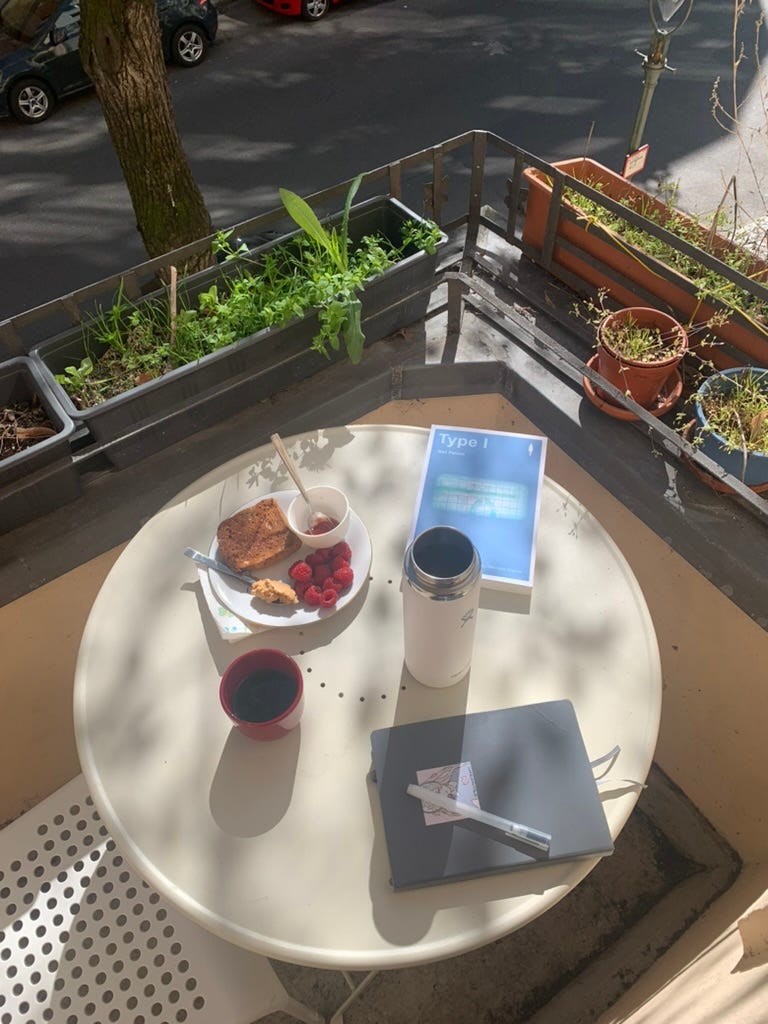#7: Adina Glickstein
"This year, I learned how to cry. Crying well is essential for good health, I think."
Today’s guest is Adina Glickstein, a brilliant writer and editor who kindly offered herself as a guest contributor. You can read more of her work on Spike (perhaps most relevant: her essay on the Girl Dinner), the Times, Mubi, and more…in the meantime, enjoy.
#7: Adina Glickstein
Taurus/Gemini/Leo
Boulder, CO
What does health, or being healthy, mean to you?
To me, being healthy means being resilient — having a foundation and a consistent set of practices that serve you, but also being able to deviate from them and then course-correct as needed. The times in the past when I’ve been super dogmatic about “wellness” have actually been some of my least healthy, in retrospect. The impulse to control, to master, to dominate can’t be the foundation of good health. Health, for me, has looked like getting more comfortable with being less “in control” while still keeping some structure and integrity. Learning how to navigate this apparent paradox has been the trajectory of my health journey, lately.
How would you describe your current lifestyle?
I’m a student and freelancer, so my schedule can be quite erratic. I try to keep things grounded with simple routines. Lots of tea! Being in grad school gives me permission to be shameless about my caffeine consumption. My favorite teas are on the “interesting” end of the basic spectrum: hojicha, genmaicha, lapsang sochung…This year, I want to become more knowledgeable about other, more out-there varieties.
I walk as much as possible, which is still less than I’d like. The adjustment from being in walkable cities like New York and Berlin to a car-centric one like Boulder has been hard for me. I’ve never been huge on biking as a mode of transport — usually just as a recreational activity, taking long, aimless rides — but one of my other goals is to get into biking to school this spring so I can be less car-reliant and breathe more fresh air.
A nice thing about being a student is that I have more control over how I structure my time than I did when I was working a 9-5. One of the greatest luxuries is being able to pause whatever I’m working on in the afternoon and stream a Katonah Yoga class via The Studio. Katonah Yoga has become so dear to me in the last few years; I first practiced it when I was living in Berlin and a friend was doing PR for an upscale gym that had just opened [Editor’s note: Hagius in Mitte, though the instructor, Toni, doesn’t teach there anymore], so I got a free private Katonah Yoga lesson, which consisted of this modelesque German woman essentially Shibari-ing me with yoga straps and putting her foot in the middle of my back with extraordinary, indescribable care as she cooed quotations about the Magic Square. Divine. I mostly practice at home now because I don’t know a Katonah teacher in Boulder, but when I travel to other cities, I love to take class and practice in community.
How do you start and end your days?
I’m bad in the mornings. I usually wake up and immediately check my email. I’m working on this by keeping a book next to my bed — poetry or something short and digestible — and reading that, first thing, instead. Right now I’m working my way through Ursula Le Guin’s translation of the Tao Te Ching. I try to get sunlight on my face pronto, even if it just means going outside to take out the recycling. If I know I won’t be home later in the day, I’ll do yoga in the morning, but I prefer it later in the day. My housemate has immaculate sleep hygiene (ily Warren, healthy king!) and he recently replaced the bulb in our living room lamp with a warmer-toned one to limit blue light exposure in the evening. I love it. I turn on a red lamp in my room at night; I don’t know if it’s legitimately therapeutic, but it sets a ~vibe~. Trying to get better at nighttime laptop-screen-avoidance but honestly I love to drift off watching lectures on YouTube. Last night: Adrian Piper talking about Hume. Embarrassing, but Slavoj Zizek is in the regular rotation, too. Something about his vocal cadence knocks me right out. Otherwise, I wind down by listening to music and staring at the ceiling. I have a strong preference towards falling asleep in someone’s arms whenever the situation allows.





